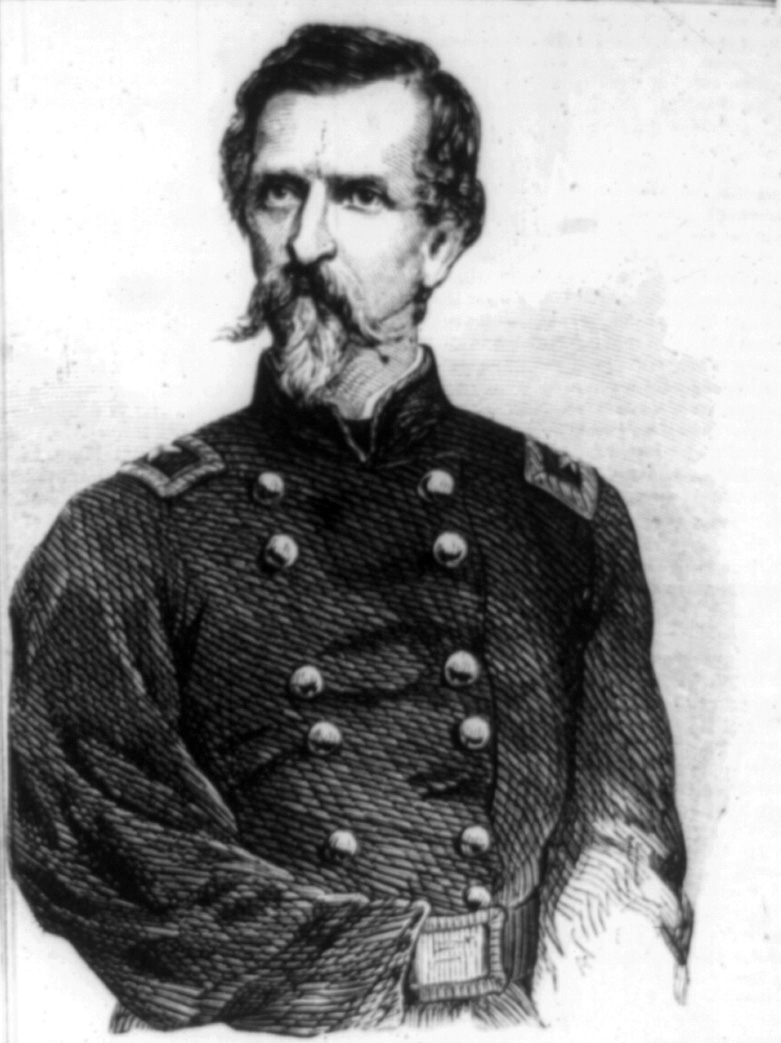Union Heroic Poetry: Kearny at Seven Pines

I’ve probably been reading or looking in all the wrong places, but I’ve had a hard time finding “heroic style” poetry for dead Union officers. (I mean the ones that died in battle ’cause I know they’re all dead now.)
It just seems like the Confederates spent a lot more time mourning and memorializing their dead officers in war-poetry. As least that’s my current impression supported by an admittedly non-comprehensive search. If you have tips on a Union collection or links to that type of newspaper poetry, send them my way, please.
So…I was rather excited to find a couple of clearly Union poems while paging through a huge volume of old American poetry at a friend’s house. One of the pieces was a heroic style, short tale, and inspiring lament for Union General Philip Kearny. Edmund Clarence Stedman penned this poem, and he spent time as a journalist covering the war with the Army of the Potomac.
KEARNY AT SEVEN PINES
So that soldierly legend is still on its journey,-
That story of Kearny who knew not to yield!
‘Twas the day when with Jameson, fierce Berry and Birney,
Against twenty thousand he rallied the field.
Where the red volleys poured, where the clamor rose highest,
Where the dead lay in clumps through the dwarf oak and pine,
Where the aim from the thicket was surest and nighest,-
No charge like Phil Kearny’s along the whole line.
When the battle went ill, and the bravest were solemn,
Near the dark Seven Pines, where we still held our ground,
He rode down the length of the withering column,
And his heart at our war-cry lept up with a bound;
He snuffed, like his charger, the wind of the powder,-
His sword waved us on and we answered the sign;
Loud our cheer as we rushed, but his laugh rang the louder.
‘There’s the devil’s own fun, boys, along the whole line!’
How he strode his brown steed! How he saw his blade brighten
In the one hand still left,-and the reins in his teeth!
He laughed like a boy when the holidays heighten,
But a soldier’s glance shot from his visor beneath.
Up came the reserves to the mellay infernal,
Asking where to go in-through the clearing or pine?
‘O, anywhere! Forward! ‘Tis all the same, Colonel:
You’ll find lovely fighting along the whole line!’
Oh, evil the black shroud of night at Chantilly,
That hid him from sight of his brave men and tried!
Foul, foul speed the bullet that clipped the white lily,
The flower of our knighthood, the whole army’s pride!
Yet we dream that he still,-in that shadowy region
Where the dead form their ranks at the wan drummer’s sign,-
Rides on, as of old, down the length of his legion,
And the word is still ‘Forward!’ along the whole line.
Interesting tribute to Kearny. Thank you. There hasn’t been a biography of Kearny in many years, but fortunately one is due out next year. Let’s hope it’s a good one.
What a dilemma! Here is my take on the poetry deal, and I read a lot of poetry along with everything else. The North was the main place where real poetry was published. The North had many poets and most of them wrote something about the Civil War. The most elegiac work I have seen is in reference to the Irish as a race and their efforts in the war. But stuff about specific generals? Not so much. I wonder if it is because Emerson or Whitman chose other topics. Certainly when Whitman wrote about Lincoln after the assassination those offerings were widely read. Plus I think–dare I try to think like a Confederate?–that individual leaders were more important to the Confederacy than they were to the Union, especially as the war wound onward.
All that being said, I have truckloads of poems about the death of the gallant Ellsworth. I am thinking of handing them out for Hallowe’en…